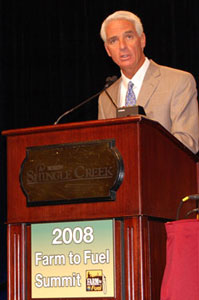 During this week’s ribbon-cutting ceremony at the new National Biodiesel Board building in Jefferson City, those in attendance included local and state officials and nine members of the Board from around the country.
During this week’s ribbon-cutting ceremony at the new National Biodiesel Board building in Jefferson City, those in attendance included local and state officials and nine members of the Board from around the country.
Ed Hegland, chairman of the NBB, told the crowd that as a family farmer from Appleton, Minnesota he has felt the pain at the pump as fuel prices have skyrocketed.
“However, prices would be about 15 percent higher if biofuel producers were not increasing their output, according to a US Department of Energy estimate,” said Hegland.
And Hegland said that with increased efficiencies, America’s farmers are able to produce the energy AND the food the world needs.
“With biodiesel, we can have both food and fuel.”
Listen to Hegland’s remarks here: NBB chair Ed Hegland [audio:http://www.zimmcomm.biz/domesticfuel/EdHeglandceremony1.mp3] Read More



 Oklahoma might be famously known for its “winds that come sweepin’ down the plains,” and one of the leading universities in the state is going to put that to work.
Oklahoma might be famously known for its “winds that come sweepin’ down the plains,” and one of the leading universities in the state is going to put that to work. “It is our patriotic duty as Americans to help our country achieve energy independence,” Boren said at a news conference at OU. “We should become a national role model for the environment.”
“It is our patriotic duty as Americans to help our country achieve energy independence,” Boren said at a news conference at OU. “We should become a national role model for the environment.”
 This week, Belgian professor and so-called United Nations “expert” Olivier de Schutter tried to blame the rise in food prices on biofuels. But Jobe fought back with the best weapon available:
This week, Belgian professor and so-called United Nations “expert” Olivier de Schutter tried to blame the rise in food prices on biofuels. But Jobe fought back with the best weapon available:  While the soaring price of oil is overwhelmingly recognized as the major factor driving food price increases, biofuels such as ethanol and biodiesel have had a marginal effect on the increase in food prices in the U.S. – about four to five percent – according to the U.S. Department of Energy and the USDA.
While the soaring price of oil is overwhelmingly recognized as the major factor driving food price increases, biofuels such as ethanol and biodiesel have had a marginal effect on the increase in food prices in the U.S. – about four to five percent – according to the U.S. Department of Energy and the USDA. Jenna Higgins Rose, the friendly communications director at NBB, gave me the “nickel tour” (although it didn’t cost a dime!) of their new digs. That’s Jenna on the right, showing me the new conference room with a state-of the art video conferencing system with the NBB’s office in Washington, DC (that’s a picture of the DC office on the screen). This is just one example of how the good folks at NBB are really practicing what they preach. Doing a conference over a video conference saves them not only thousands of dollars and many hours of travel time, but they greatly reduce their carbon footprint by not burning the fuel needed to fly to the various locations that this truly national organization covers.
Jenna Higgins Rose, the friendly communications director at NBB, gave me the “nickel tour” (although it didn’t cost a dime!) of their new digs. That’s Jenna on the right, showing me the new conference room with a state-of the art video conferencing system with the NBB’s office in Washington, DC (that’s a picture of the DC office on the screen). This is just one example of how the good folks at NBB are really practicing what they preach. Doing a conference over a video conference saves them not only thousands of dollars and many hours of travel time, but they greatly reduce their carbon footprint by not burning the fuel needed to fly to the various locations that this truly national organization covers.
 According to a
According to a  “The goal is to determine the best crop management, storage and handling practices for Georgia, and just as important, the performance of herbaceous biomass in Range Fuels’ conversion process,” said Anna Rath, Ceres vice president of commercial development. She noted that grass species, including both annuals and perennials, can provide a flexible and reliable supply of raw materials for fuel and power. “This is an important step in demonstrating that energy crops can be successfully and sustainably grown in the area surrounding the Range Fuels Soperton Plant site,” she said.
“The goal is to determine the best crop management, storage and handling practices for Georgia, and just as important, the performance of herbaceous biomass in Range Fuels’ conversion process,” said Anna Rath, Ceres vice president of commercial development. She noted that grass species, including both annuals and perennials, can provide a flexible and reliable supply of raw materials for fuel and power. “This is an important step in demonstrating that energy crops can be successfully and sustainably grown in the area surrounding the Range Fuels Soperton Plant site,” she said. Florida Governor Charlie Crist says an ethanol plant may be built on land that the state is buying from U.S. Sugar to use for Everglades restoration.
Florida Governor Charlie Crist says an ethanol plant may be built on land that the state is buying from U.S. Sugar to use for Everglades restoration. Democratic presidential candidate Barack Obama spoke to the NFU members by phone and pledged his support for new investments in renewable fuels and other policies that would benefit rural America. Obama also reiterated his support of the Renewable Fuels Standard. “I am strongly committed to advancing biofuels as a key component of reducing our dependence on foreign oil,” he told the NFU members.
Democratic presidential candidate Barack Obama spoke to the NFU members by phone and pledged his support for new investments in renewable fuels and other policies that would benefit rural America. Obama also reiterated his support of the Renewable Fuels Standard. “I am strongly committed to advancing biofuels as a key component of reducing our dependence on foreign oil,” he told the NFU members.